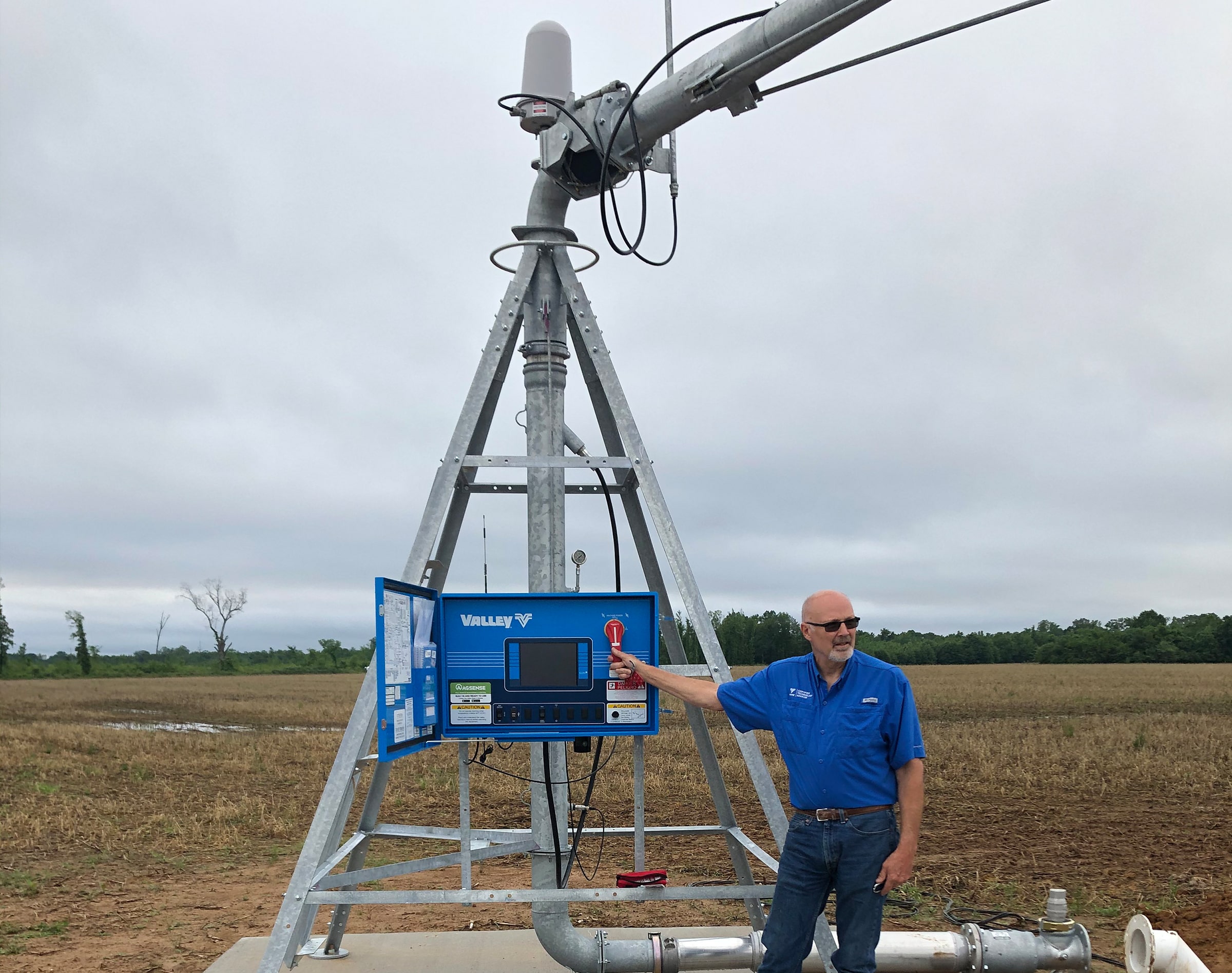by
User Not Found
| Feb 10, 2022

As the world's population grows, the need to grow more food with fewer resources becomes even more important, but not every place has equal access to water. Agricultural technology is helping shape the future of sustainability. Doug Parrish, a Valley Certified Irrigation Designer in New Market, Alabama, helped spearhead a government program to boost irrigated acres in the state—while conserving water and energy.Only 10% of Alabama's total agricultural acres are irrigated. When he learned that state and federal officials set a goal of increasing the state's irrigated acres, Doug Parrish of New Market Ag, a Valley Dealer in New Market, Alabama, knew he had to be involved.
As their dealership name states, participants in the program would literally be a new market: growers who had never irrigated before. It would also be an opportunity to further position Valley® Irrigation as the leader in efficient, sustainable irrigation technology.
Knowing the opportunity would be a great start to long-term relationships—and that farmers were soft on spending due to low grain prices—Parrish was proactive in his approach. He began working very closely with the team at the Alabama Soil and Water Conservation offices to help them meet their goal.
"Alabama has very few irrigated acres compared to surrounding states," says Ashley Henderson, P.E., Director of Conservation Programs for the Alabama Soil and Water Conservation Committee (ALSWCC). "Florida has about 1.3 million irrigated acres, Georgia has 1.2 million and Mississippi has 1.8 million. Alabama has only 162,000 irrigated acres."
The Alabama Irrigation Initiative was initially designated to increase irrigation in Alabama in ways that will be sustainable, she continues, "and Parrish, New Market Ag and Valley had a wealth of knowledge to share with us."
The Watershed Protection and Flood Prevention Act authorizes the Natural Resources Conservation Service (NRCS) to help local organizations and governments plan and implement watershed projects. So the NRCS initially designated a $10 million program specifically for sustainable irrigation. The first $2 million was allocated for technical assistance and support in writing watershed plans and submitting those plans through NRCS. The remaining $8 million was set aside for farmers in adding sustainable irrigation in the Middle Tennessee River watershed.
Not that there wouldn't be challenges. "While 10% of America's water flows through Alabama," Parrish says, "water availability at the right place can be tricky."
How it Started
The first hurdle was to conduct a watershed evaluation, followed by an economic evaluation and a water conservation evaluation, to identify the areas that would be most feasible to implement the project when a variety of factors including erosion and connected habitats were taken into account. This process identified the Middle Tennessee River watershed in northern Alabama as the first stop, followed by the Choctawhatchee-Pea Rivers watersheds in southern Alabama and the Middle Alabama River watershed in central Alabama, each phase taking about two years to complete.
Any grower could submit an application to be a part of this program. There were, however, three main criteria that factored into approval:
- History demonstrating a conservation ethic
- A dependable water source
- A cost-effective power source
Once approved, the grower would complete the project and ALSWCC would provide a 50% rebate, based on receipts and invoices showing the amount spent on the project. Each farmer was limited to a $200,000 rebate and had to bring new acres under irrigation. Items eligible for the rebate included irrigation pumps, center pivots, wells (excluding exploratory wells), pipelines, floating river screens and more.
Growers were of course free to choose their own irrigation vendors, but Parrish and the team at New Market Ag helped supply the growers with all the information they would need, from drawings to cost estimates so they could see what the cost per acre would be for their new pivots. They also created an evaluation that outlined the cost and benefits of installing flowmeters, soil moisture monitoring and remote management technology.
"Doug and the team at New Market were critical in making sure this went very smoothly for Valley customers," Henderson says. "They were really responsive to our needs and the needs of our producers. Whether it was preliminary designs, invoices, or just general information, he helped out quickly, made it easy to understand and was very detailed. That's what made it great to work with him and New Market Ag."
Parrish holds many certifications from the Irrigation Association, including Certified Irrigation Designer (CID). Each submission by the farmer is required to have a CID review designs and stamp it with compliance approval from the NRCS, as well as standard irrigation design practices recognized in the industry.
Technology that Helps Sustainability
"Alabama ranks in the top 10 percent for aquatic biodiversity in terms of mussels and snails, and we can be considered America's 'Amazon,' for our aquatic biodiversity," Henderson says. "So at the state level we had to be very cognizant of the environmental part of this program, as well. We wanted to ensure growers were utilizing the very best conservation methods possible. Doug's team made sure that every technological advancement was available."
One of those technological advancements is Valley 365®. Henderson calls the connected crop management platform an important tool. "Providing the producers in this program with flowmeters, soil moisture sensors, weathers stations and the irrigation scheduling assistance they gain through Valley 365 or something similar is important to us. This technology provides producers with real-time information about crop water needs and their individual water use, encouraging an informed and sustainable use of on-farm water."
This program is naturally tailored toward Alabama, but irrigation offers benefits to growers nationwide. To optimize your farming operations, increase yields, save input costs and work sustainably, check if your state's branch of the NRCS offers upgrades to make irrigation more efficient. Or contact your local Valley Dealer.